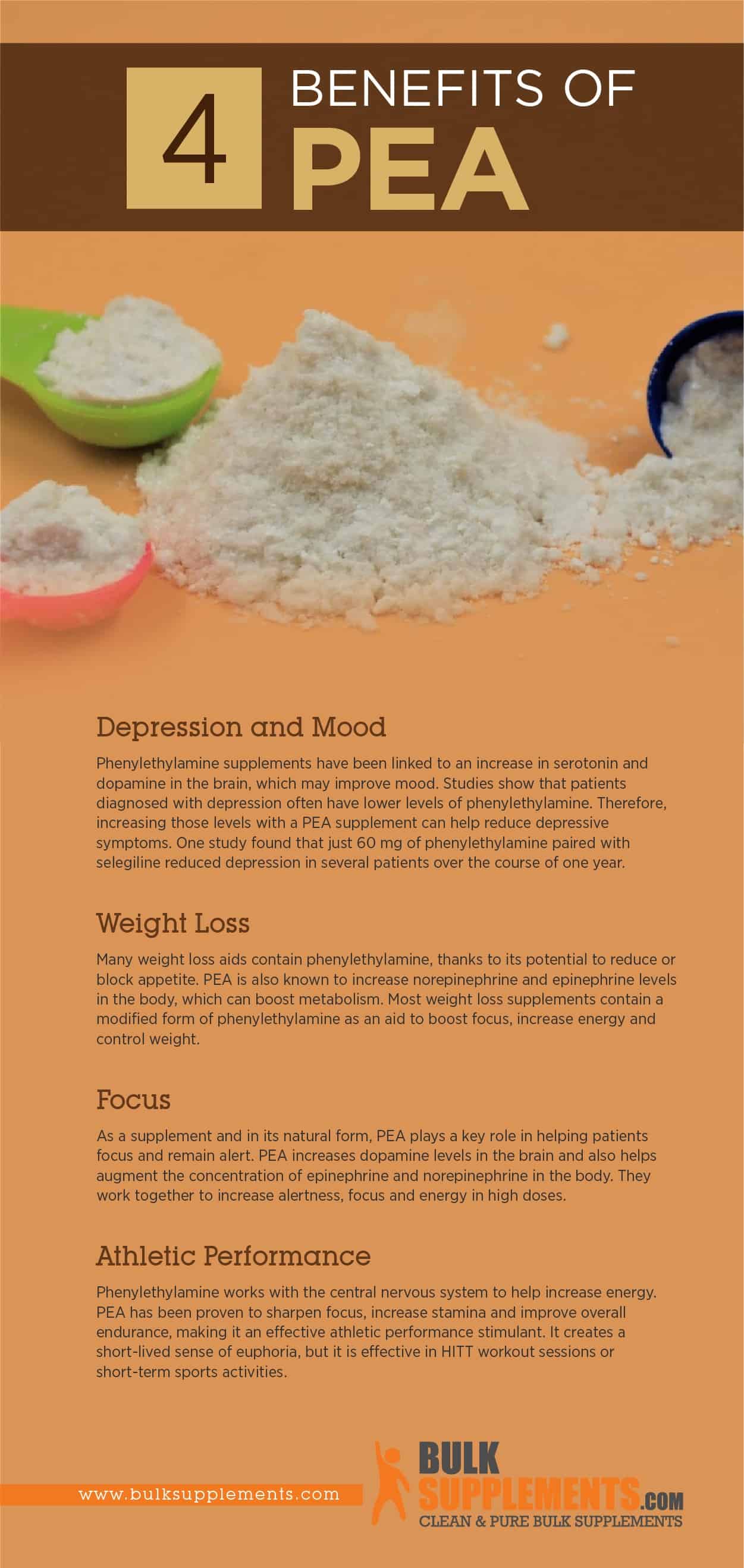Phenylethylamine HCL (PEA): Benefits, Side Effects & Dosage

Phenylethylamine HCL
What Is Phenylethylamine HCL?
Phenylethylamine HCL (PEA) is available as a supplement, but it is also a chemical that the body produces naturally. PEA is classified as a neuroregulator and neurotransmitter, so it plays an important role in controlling mood and cognition. This organic compound is a natural monoamine alkaloid and a trace amine. In its natural form, PEA is a nervous system stimulant.
It also encourages the body to produce other chemicals that may help control some psychiatric conditions. Most people are able to create enough PEA naturally, but a supplement is an effective solution for those who don’t. Athletes use it to help improve performance, but it is also an effective weight loss aid. Studies show a connection between mood, focus and even symptoms associated with depression.
Food Sources of Phenylethylamine
Cocoa beans are the main food source that contains phenylethylamine, as well as food made with cocoa beans, cocoa powder or chocolate. It is also found in some protein-rich foods. Beef products, soy protein, chicken, shrimp and pork products are good sources of phenylethylamine.
Benefits of PEA
Phenylethylamine HCL has a range of benefits in its natural form and as a supplement. For instance, it may improve focus, relieve depression, lessen ADHD symptoms and even help with weight loss.
Depression and Mood
Phenylethylamine supplements have been linked to an increase in serotonin and dopamine in the brain, which may improve mood. Studies show that patients diagnosed with depression often have lower levels of phenylethylamine. Therefore, increasing those levels with a PEA supplement can help reduce depressive symptoms. One study found that just 60 mg of phenylethylamine paired with selegiline reduced depression in several patients over the course of one year.
Weight Loss
Many weight loss aids contain phenylethylamine, thanks to its potential to reduce or block appetite. PEA is also known to increase norepinephrine and epinephrine levels in the body, which can boost metabolism. Most weight loss supplements contain a modified form of phenylethylamine as an aid to boost focus, increase energy and control weight.
Focus
As a supplement and in its natural form, PEA plays a key role in helping patients focus and remain alert. PEA increases dopamine levels in the brain and also helps augment the concentration of epinephrine and norepinephrine in the body. They work together to increase alertness, focus and energy in high doses.
Athletic Performance
Phenylethylamine works with the central nervous system to help increase energy. PEA has been proven to sharpen focus, increase stamina and improve overall endurance, making it an effective athletic performance stimulant. It creates a short-lived sense of euphoria, but it is effective in HIIT workout sessions or short-term sports activities.

Side Effects of PEA
PEA is generally safe in its natural form. Taking a phenylethylamine supplement is safe in appropriate dosages, but it does pose the risk of side effects since it works similarly to amphetamine. Low dosages are generally safe and usually result in little to no side effects. Common but generally mild side effects of larger doses include nausea, headaches and constipation. More serious side effects may include:
Rapid Heart Rate
Phenylethylamine is a stimulant similar to caffeine or amphetamine, so large doses can cause a startling increase in heart rate, especially when it is mixed with other stimulants.
Anxiety
Since phenylethylamine PEA works as a stimulant, large doses can increase adrenaline and raise blood pressure and heart rate, which may increase anxiety. The supplement affects dopamine levels in the body and they may suddenly fluctuate.
Insomnia
A phenylethylamine HCL supplement stimulates chemicals in the brain that produce extra energy and focus. In large doses or too close to bedtime, PEA can often trigger insomnia.
Dehydration
Stimulants can result in dehydration. It’s important to increase water intake while taking this supplement.
Special Precautions & Warnings
Pregnancy and Breastfeeding
Researchers have not conducted enough studies to determine how PEA may affect fetuses during gestation or infants after they ingest breast milk. To be safe, patients who are pregnant or breastfeeding should refrain from it.
Surgery
Patients undergoing surgery should stop taking phenylethylamine supplements at least two weeks prior to the operation because it impacts the central nervous system and may interfere with the procedure.
Bipolar Disorder and Schizophrenia
Patients who have been diagnosed with bipolar disorder should avoid PEA supplements. The supplement may cause the patient to shift from depression to mania. Schizophrenia patients should also use caution taking PEA because according to research, it may increase hallucinations and delusions.
SEE ALSO

Chanca Piedra: Benefits, Side Effects & Dosage
Dosage for PEA
The body breaks down PEA supplements quickly and they pass through the blood-brain barrier easily to give users a much-needed boost to the central nervous system. The supplement is available in salt, powder and tablet form for easy dosing and consumption. Since the chemical is short-lived, opting for a slow release is typically the best way to prolong the effects.
The appropriate dosage for PEA HCL is 100-500 mg or ⅛ tsp unless a doctor advises a different amount. Different individuals may require different doses, but exceeding the maximum dosage, 500 mg, is not recommended. Overdosing can cause psychosis, seizures, coma and even death.
Why Take PEA?
Using phenylethylamine supplements may be a great way to help boost weight loss efforts and improve athletic performance. It may also be a reliable way to reduce symptoms of depression, as well as increase overall concentration. Phenylethylamine occurs naturally in the body; as a supplement, metabolization is quick, making it a relatively safe choice for oral use in most patients. If you’re seeking a way to get the upper hand on your workouts or your weight loss without worrying about a slew of side effects, then PEA may be an option worth considering.
The amount of phenylethylamine that you take depends on how you consume it, the specific results you are seeking and whether you are pairing the supplement with other chemicals. Each dosage and form has a different effect on the body, so it’s vital to understand how PEA works in the body prior to starting a supplement regimen.
The Bottom Line
Phenylethylamine (PEA) is one of the most common supplements out there for weight loss. It may also have mood enhancing and energy boosting effects. PEA is classified as a neuroregulator and a neurotransmitter. The body produces PEA naturally to stimulate the nervous system. It is also found in several foods, but using a supplement can ensure a controlled and consistent dosage.
PEA is generally safe. However, some medical conditions and medications may interact with phenylethylamine HCL, such as blood pressure medication, heart conditions and psychosis disorders. These patients should refrain from this supplement, unless a medical professional prescribes them. Phenylethylamine HCL is a stimulant that can cause harsh, unwanted side effects. For those looking to give their workouts an extra boost or get an extra edge on their weight loss efforts, PEA supplements can be a reliable option. This supplement is not a treatment for medical conditions. Always consult a doctor before starting a supplement regimen.



